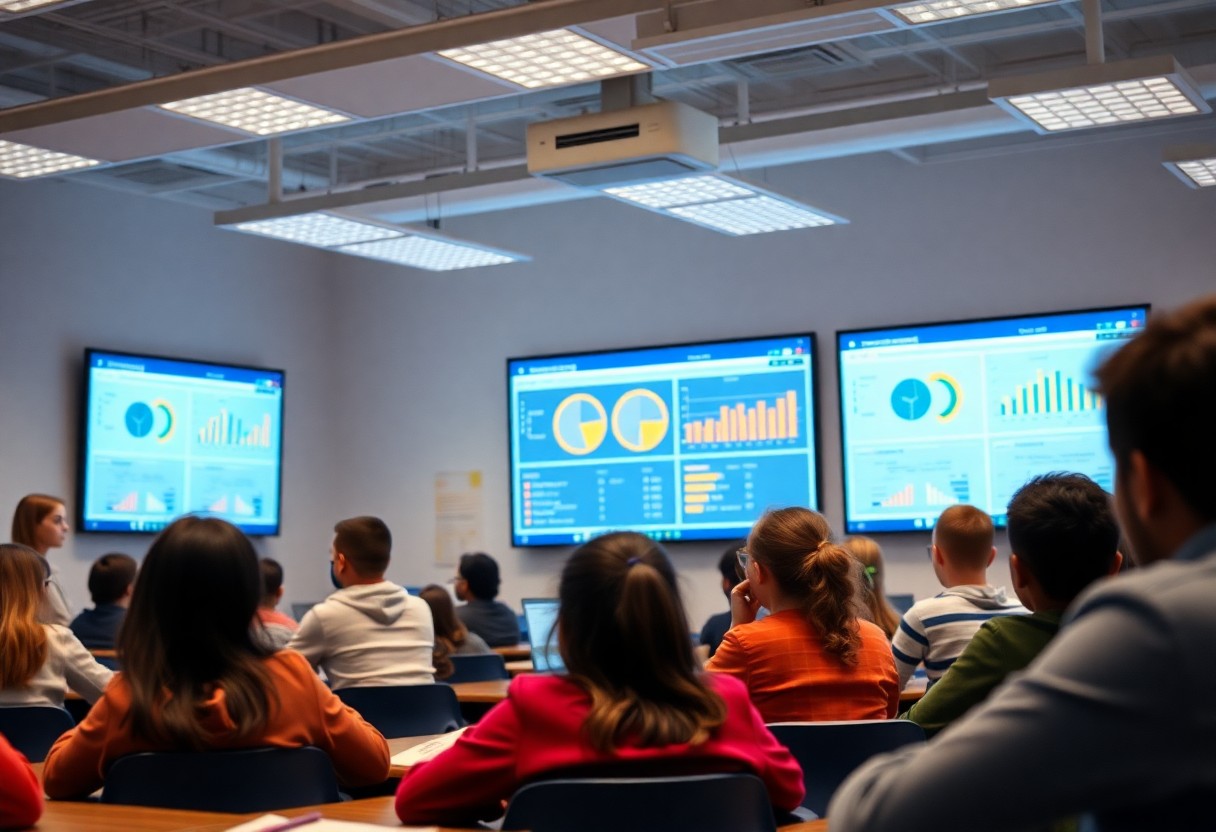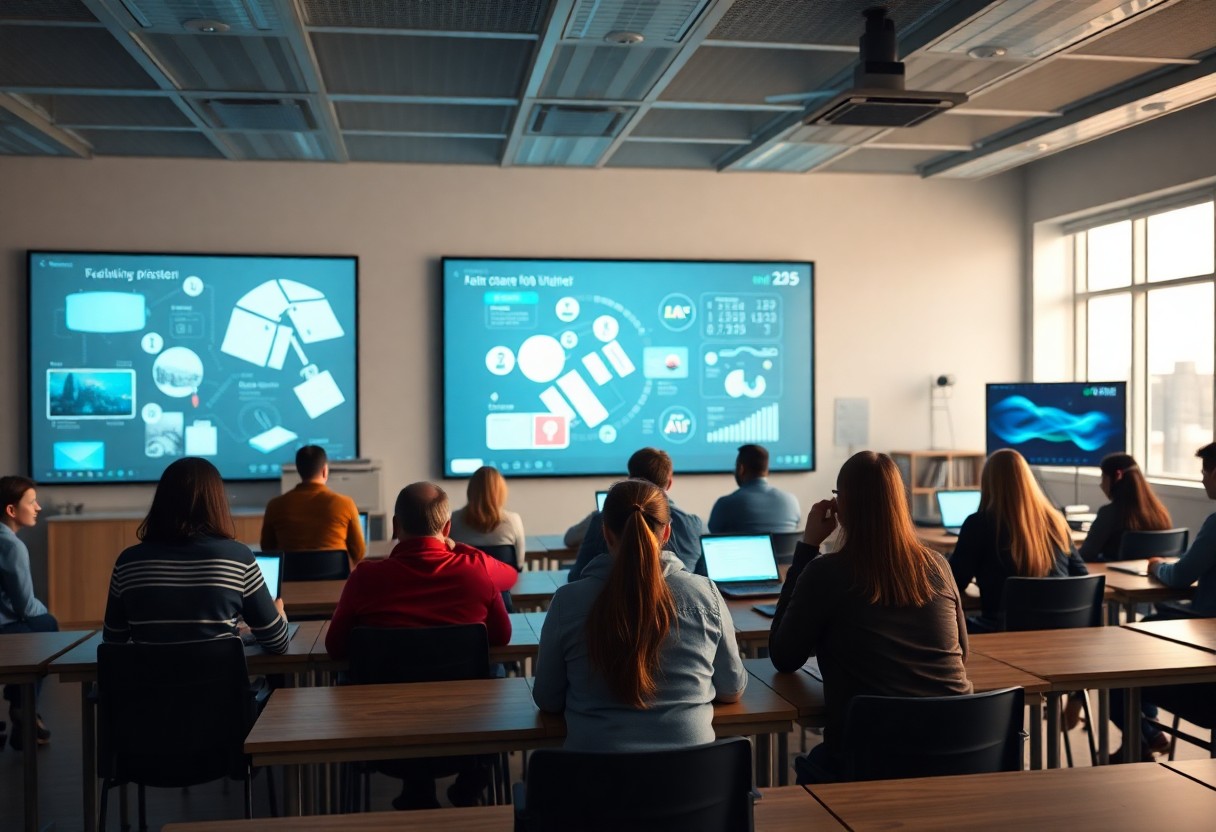You may be curious about how cognitive diagnostics can significantly impact student performance in adaptive learning environments. As education evolves, understanding your strengths and weaknesses is more important than ever. Cognitive diagnostics provide insights into how you learn, allowing personalized pathways tailored to your unique needs. This blog post will explore how incorporating these diagnostics into adaptive learning platforms can not only enhance your educational experience but also drive greater success in mastering complex subjects.

Key Takeaways:
- Cognitive Diagnostics provide insights into a student’s learning processes, allowing for tailored educational experiences.
- Adaptive Learning Platforms can utilize cognitive diagnostic data to customize curricula and resources based on individual student needs.
- Effective Interventions can be developed through understanding specific cognitive strengths and weaknesses, addressing learning gaps more efficiently.
- Data-Driven Decision Making enhances instructional strategies by integrating diagnostic assessments into learning platforms.
- Increased Engagement in students is achieved when learning experiences are personalized, leading to better overall performance and satisfaction.
Understanding Adaptive Learning Platforms
Definition and Principles of Adaptive Learning
The foundation of adaptive learning platforms lies in their ability to tailor educational experiences to individual student’s needs. Among educational technologies, adaptive learning utilizes algorithms and analytics to adjust content based on your progress, performance, and preferences. This personalized approach enhances your comprehension and retention by presenting materials in a manner aligned with your unique learning style.
You are guided through a customized learning path that identifies gaps in your knowledge and reinforces your understanding. The principles of adaptive learning focus on continuous assessment and immediate feedback, which enables you to take charge of your learning journey and engage with the content more effectively.
Key Features and Technologies in Adaptive Learning
Understanding the key features and technologies inherent in adaptive learning platforms is vital for appreciating their effectiveness. Among these features, you will find:
- Personalized Learning Paths
- Real-Time Analytics and Reporting
- Automated Feedback Mechanisms
- Content Recommendations based on Performance
- Integration with Learning Management Systems (LMS)
- Interactive and Multimedia Content
Perceiving how each of these elements functions within the platform gives you insight into how your learning experience is modified dynamically based on your interactions.
Additionally, understanding the technologies that enable adaptive learning such as artificial intelligence, machine learning, and data analytics helps you recognize the evolution of educational tools designed to enhance your learning outcomes. Your engagement is encouraged by smart content curation that actively builds on your existing knowledge base.
Benefits of Adaptive Learning for Students
On a personal level, adaptive learning offers numerous benefits that can transform your educational experience. This approach allows you to progress at your own pace, ensuring that you fully grasp each concept before moving on. The real-time feedback you receive enhances your alertness to areas for improvement, which in turn fosters greater motivation from you to achieve your learning goals.
Engaging with adaptive learning platforms also promotes an increased sense of ownership over your studies. By adjusting the learning material to your individual needs, the platform empowers you to take control of your education, leading to a more fulfilling academic experience.
Learning within an adaptive environment means you are better equipped to face challenges and overcome obstacles. Your ability to receive prompt support tailored to your needs helps mitigate frustration and promotes a positive attitude towards learning. The continuous feedback loop ensures that you are consistently aware of your progress, allowing you to celebrate your achievements and set more ambitious targets.
The Role of Cognitive Diagnostics
Any discussion about enhancing student success in adaptive learning platforms must highlight the significance of cognitive diagnostics. Cognitive diagnostics plays a pivotal role in understanding the unique learning needs and patterns of individual students. By begining on a journey through cognitive diagnostics, you can uncover valuable insights into how learners process information, identify knowledge gaps, and leverage their strengths for improved educational outcomes.
What is Cognitive Diagnostics?
To understand cognitive diagnostics, you should view it as a framework that investigates the cognitive processes involved in learning. It integrates various assessment techniques to gauge not only what students know but also how they acquire and apply knowledge. This holistic approach allows educators and adaptive learning platforms to map the cognitive abilities of learners, leading to tailored educational experiences that meet specific needs.
To get the most out of cognitive diagnostics, it is important to appreciate its multifaceted nature. It encompasses a range of assessment types, including formative assessments that can occur during the learning process, as well as summative assessments that evaluate your overall understanding after completing a course or module. This comprehensive view enables personalizing learning strategies, which can significantly increase your chances of successful outcomes.
The Importance of Cognitive Diagnostic Assessment
Assessment plays a fundamental role in cognitive diagnostics as it not only identifies where you stand in terms of knowledge but also illuminates the cognitive strategies that contribute to your learning. By employing diagnostic assessments, educators can better understand your thought processes, which can inform adaptive learning platforms in providing customized pathways suited to your unique learning profile.
In addition, cognitive diagnostic assessments function as a bridge between traditional evaluations and more adaptive measures. They allow for continuous feedback that can steer your learning journey. By pinpointing strengths and weaknesses, you can adjust your focus accordingly, leading to more effective study habits and improved performance over time.
Tools and Techniques in Cognitive Diagnostics
By leveraging various tools and techniques, cognitive diagnostics become more effective in providing insights into your learning. These may include computer-based assessments, interactive tasks, and analytical tools designed to gather data on your performance. Examining this information can reveal patterns and trends that are otherwise obscured in conventional testing methods, enabling a richer understanding of your learning style and preferences.
Consequently, the integration of technology and analytics in cognitive diagnostics equips educators and adaptive learning platforms to devise strategies that resonate with you as a learner. Techniques such as machine learning algorithms and data visualization can synthesize vast amounts of information, making it easier for you to understand your performance metrics and driving personalized learning experiences that cater specifically to your cognitive abilities.
Linking Cognitive Diagnostics with Adaptive Learning
Notably, the synergy between cognitive diagnostics and adaptive learning platforms can provide a transformative experience for students. By evaluating students’ cognitive strengths and weaknesses, cognitive diagnostics enable educators to tailor learning experiences that suit individual needs. This personalized attention not only fosters engagement but also enhances retention and mastery of subjects, ultimately paving the way for greater student success. In this context, you can see how these assessments serve as a foundation for creating optimal learning environments, addressing gaps in knowledge, and promoting deeper understanding of the material.
How Cognitive Diagnostics Inform Learning Pathways
The integration of cognitive diagnostics in adaptive learning platforms can smartly inform and refine learning pathways for each student. When you assess a student’s cognitive profile, you can derive actionable insights that help shape their educational journey. For example, if a student struggles with analytical thinking, the platform can guide them towards more foundational exercises that build this skill before they advance to more complex topics. This targeted approach ensures that students traverse their educational pathways more effectively, reducing frustration and enhancing overall performance.
Real-Time Feedback and Adjustments
With real-time capabilities of adaptive learning platforms, you can receive instant feedback that directly corresponds to your learning experience. This immediate response not only keeps you informed about your progress but also helps in identifying areas needing improvement without delay. As a result, the system can proactively adjust the learning materials and challenges you encounter based on your current performance and cognitive capabilities. Your learning journey becomes dynamic, allowing for a more fluid and responsive educational atmosphere that can adapt to your unique pace.
Adaptive learning platforms, through the use of cognitive diagnostics, can implement continuous adjustments that reflect your learning needs. This capability encourages a growth mindset, as you are consistently guided towards challenges that are both achievable and constructive. Such a nuanced approach can decrease feelings of overwhelm and increase motivation, leading to a more enjoyable and effective learning experience.
Case Studies of Successful Integration
Among the various educational institutions that have commenceed on the journey of linking cognitive diagnostics with adaptive learning, several notable cases have demonstrated significant positive outcomes. These case studies not only highlight the effectiveness of such integrations but also showcase quantifiable improvements in student performance.
- University of Southern California: Implemented cognitive assessments in conjunction with adaptive learning tools, leading to a 20% improvement in retention rates among first-year students over two semesters.
- North Carolina State University: Reported a 30% increase in student engagement and a 25% improvement in test scores after integrating cognitive diagnostics into their adaptive learning programs.
- Arizona State University: Utilized cognitive analytics to personalize learning, resulting in a 40% reduction in course dropouts and a 15% increase in completion rates for online courses.
- Clemson University: After implementing an adaptive learning platform that includes cognitive diagnostics, they observed an overall GPA increase of 0.5 points in targeted courses.
Cognitive diagnostics bring about a relentless improvement in teaching strategies and learning outcomes. The data derived from these assessments not only aids in fine-tuning individual learning paths but also fosters a comprehensive understanding of each student’s academic journey. As you engage with adaptive learning platforms, these insights can be pivotal in offering you the educational experience that caters specifically to your cognitive needs, thereby ensuring successful learning outcomes and equipping you for future challenges.
Enhancing Individual Learning Outcomes
Keep in mind that enhancing individual learning outcomes in adaptive learning platforms requires a multifaceted approach. By integrating cognitive diagnostics, these platforms can tailor educational experiences to meet the specific needs of each student, ensuring a more effective and engaging learning process. You have the opportunity to leverage these tools to track your progress and adjust your learning path based on real-time feedback, creating a more personalized education experience that can boost your success.
Personalization of Learning Experiences
Across various adaptive learning platforms, the ability to personalize your learning experience is a game-changer. Cognitive diagnostics play a significant role in understanding your unique strengths and areas needing improvement. As a result, educational content can be tailored to suit your pace, learning style, and preferences, making the learning process not only more effective but also more enjoyable for you. When you receive material that aligns with your individual needs, it enhances your engagement and retention of the information.
Additionally, this personalized approach allows for flexibility in your learning journey. You can explore subjects that pique your interest or revisit concepts that you find challenging, all based on insights gathered through cognitive assessments. By facilitating a more customized educational experience, these platforms empower you to take control of your learning path and directions.
Identifying Learning Gaps and Misconceptions
Beside personalization, identifying learning gaps and misconceptions is another area where cognitive diagnostics shine. By employing these assessments, adaptive learning platforms can help you recognize specific areas where your understanding may be lacking. This process not only highlights what you don’t know but also pinpoints the reasons behind those gaps, allowing for targeted interventions. Understanding these discrepancies provides clarity, enabling you to address misconceptions and improve your foundational knowledge.
Also, when learning gaps are brought to your attention through cognitive diagnostics, you can take proactive steps to address them. Such assessments encourage you to engage with additional resources, participate in targeted practice sessions, or request further assistance from instructors. This continuous diagnostic feedback loop fosters a growth mindset, empowering you to embrace challenges and focus on mastering content rather than just passing tests.
Encouraging Student Agency and Motivation
Across all educational contexts, encouraging student agency and motivation is fundamental for long-term success. Cognitive diagnostics within adaptive learning platforms help you take ownership of your learning by providing you with data and insights that guide your educational decisions. This increased awareness of your learning progress can inspire you to set personal goals and make informed choices about how to approach your studies. When you see your growth over time, it fosters a sense of responsibility and motivation to continue improving.
Moreover, when you are given the autonomy to choose your learning paths based on diagnostic feedback, you are likely to become more invested in the material. This personalized engagement leads not only to better academic outcomes but also to increased satisfaction in your learning experience. You are encouraged to stay curious and passionate about acquiring knowledge, making learning a more meaningful endeavor.
Consequently, when you are actively participating in your learning journey and given the right tools to assess your progress, you experience a higher level of motivation that ultimately translates into better learning outcomes. A strong sense of agency fuels a cycle of ongoing improvement and academic success, reinforcing your commitment to lifelong learning. By understanding and utilizing cognitive diagnostics, you can transform your learning experience into one that is not only productive but enjoyable as well.
Challenges and Limitations
Many educators and developers see great potential in cognitive diagnostics for enhancing student success in adaptive learning platforms; however, various challenges and limitations can hinder effective implementation. Being aware of these obstacles can help you navigate the complexities of integrating cognitive diagnostics within your educational framework.
Technological Barriers
Below are some significant technological barriers that may impede the successful application of cognitive diagnostics. First, the integration of advanced cognitive diagnostic tools requires robust technological infrastructure, including reliable internet access and compatible devices. In educational settings where resources are limited, this can lead to unequal access for students, nullifying the potential benefits of adaptive learning technologies. Furthermore, the rapid evolution of software can create difficulties in keeping up-to-date with the latest tools and techniques necessary for effective cognitive diagnostics.
Another key technological challenge is ensuring the interoperability between different educational platforms and cognitive diagnostic tools. You may encounter issues when attempting to share data between systems, which can hinder the ability to provide students with a seamless learning experience. Without effective integration, the value of cognitive diagnostics may be diminished, making it vital to carefully select platforms that offer compatibility and ease of use.
Data Privacy and Ethical Considerations
Any discussion around cognitive diagnostics must include vital considerations regarding data privacy and ethics. As educational platforms collect and analyze vast amounts of personal information about students, including their learning habits and cognitive capabilities, it is vital to ensure that this data is handled responsibly. You, as an educator or administrator, must be aware of regulations that govern the use of student data, such as the Family Educational Rights and Privacy Act (FERPA) in the United States. This will help you responsibly navigate data collection and analytics while safeguarding student privacy.
A deeper understanding of ethical considerations is vital in ensuring that cognitive diagnostics do not contribute to bias or discrimination. When algorithms are built on flawed data sets or do not account for diverse student populations, there is a risk of reinforcing existing inequalities. Adopting fair and transparent evaluation practices enables you to create a more inclusive learning environment that truly benefits all students rather than marginalizing specific groups based on their cognitive assessments.
The Need for Teacher Training and Support
Training and support for teachers play a vital role in the successful implementation of cognitive diagnostics in adaptive learning platforms. Without adequate professional development, you may struggle to utilize these tools effectively, which can limit your students’ success in harnessing the full potential of personalized learning. Investing in comprehensive training programs ensures that you are well-equipped to interpret cognitive diagnostic data and apply insights to inform your teaching strategies.
Plus, ongoing support and collaboration within your educational community are necessary for fostering a culture of continuous improvement. Engaging with peers and experts can provide you with valuable insights and strategies to enhance your instructional practices. This shared learning experience can strengthen your capacity to support students and foster an effective learning environment that adapts to their needs.
Future Trends in Cognitive Diagnostics and Adaptive Learning
Despite the rapid advancements in educational technology, the integration of cognitive diagnostics and adaptive learning is still in its early stages. As you look ahead, it’s necessary to consider how emerging technologies can enhance the efficiency and effectiveness of personalized education. By leveraging data-driven insights, educators can better understand student needs and tailor experiences that promote academic success. This necessitates a continual improvement in cognitive diagnostic tools that can measure student learning behaviors, performance, and misconceptions with greater accuracy.
Emerging Technologies and Innovations
Besides traditional methods, a variety of emerging technologies, such as virtual reality (VR), augmented reality (AR), and gamification, are set to redefine how cognitive diagnostics operate within adaptive learning platforms. These innovations can create more immersive and interactive learning experiences, allowing you to engage with content in ways you’ve never imagined. By utilizing these tools, educators can foster a multi-dimensional understanding of your learning processes, which can be invaluable for developing tailored instructional approaches.
The Role of Artificial Intelligence and Machine Learning
Artificial intelligence (AI) and machine learning (ML) are increasingly becoming integral components of adaptive learning systems. These technologies enable platforms to analyze vast amounts of data to identify patterns and trends in your learning behaviors. Through continuous learning algorithms, adaptive learning environments can dynamically adjust content difficulty and personalize learning paths based on your performance metrics and cognitive profiles.
Plus, the incorporation of AI and ML allows for real-time feedback, notifying you about areas of strength and those needing improvement. This immediacy facilitates a more responsive learning environment, allowing you to make quick adjustments to study habits or focus areas. As these technologies evolve, you can expect even more sophisticated interfaces that learn and adapt to your individual learning style, ensuring that your educational experience is optimized for maximum efficacy.
Predictions for the Next Decade in Education
Below the horizon of the next decade, we can anticipate a landscape where cognitive diagnostics are seamlessly integrated into the fabric of adaptive learning platforms. Innovations in machine learning and data usage are projected to lead to enhanced personalization, making learning experiences more relevant and engaging for you. Educational systems will become increasingly data-informed, allowing for interventions tailored specifically to your learning journey and preferences.
A key prediction is the rise of collaborative adaptive learning platforms that leverage global data to enhance your educational experience. This means that as you collaborate with peers and share insights, the system will filter and align collective intelligence toward personal success. These platforms will not only assess your learning habits in isolation but also contextually understand how you thrive in collaborative environments, ultimately fostering a more comprehensive approach to education.
To wrap up
Taking this into account, integrating cognitive diagnostics into adaptive learning platforms can significantly enhance your educational experience. By analyzing your cognitive strengths and weaknesses, these platforms can tailor learning paths that suit your individual needs. This personalized approach ensures that you engage with material that is appropriate for your current understanding, potentially leading to improved retention and mastery of subjects. Furthermore, the real-time feedback you receive allows for immediate adjustments, creating a dynamic learning environment that fosters continuous improvement.
Ultimately, the fusion of cognitive diagnostics with adaptive learning not only facilitates a more efficient learning journey but also empowers you to take control of your education. As you navigate through complex concepts, understanding your cognitive profile can guide your efforts, making your study time more effective and aligned with your personal goals. Embracing these advanced tools can be a transformative step toward achieving success in your academic endeavors.
FAQ
Q: What are cognitive diagnostics and how do they relate to adaptive learning platforms?
A: Cognitive diagnostics refer to assessment methods that aim to identify a learner’s cognitive processes, strengths, and weaknesses. In the context of adaptive learning platforms, cognitive diagnostics can provide valuable insights into individual learning styles and knowledge gaps, allowing the platform to tailor educational experiences that meet each student’s unique needs.
Q: How can cognitive diagnostics improve personalized learning experiences for students?
A: By using cognitive diagnostics, adaptive learning platforms can deliver personalized content based on each student’s diagnostic profile. This means that students receive learning materials and activities designed specifically for their current level of understanding, helping them master concepts more effectively and efficiently, leading to a more engaging learning experience.
Q: What types of data can cognitive diagnostics gather from students?
A: Cognitive diagnostics can gather various types of data, including performance metrics on assessments, comprehension levels of specific topics, cognitive strategies employed during tasks, and learning preferences identified through interactions with the platform. This data enables a comprehensive view of a student’s learning journey and can inform further instructional adjustments.
Q: Are there existing studies that support the effectiveness of cognitive diagnostics in education?
A: Yes, several studies have demonstrated the effectiveness of cognitive diagnostics in enhancing student learning outcomes. Research has shown that by accurately identifying students’ knowledge states and cognitive skills, educators can provide better interventions and supports that lead to improved academic performance in adaptive learning environments.
Q: What challenges might educators face when implementing cognitive diagnostics in adaptive learning?
A: Educators may encounter challenges such as the integration of cognitive diagnostic tools with existing learning management systems, the need for professional development to interpret and utilize the diagnostics effectively, and ensuring data privacy and security for students. Addressing these challenges is imperative to maximize the benefits of cognitive diagnostics in adaptive learning settings.




